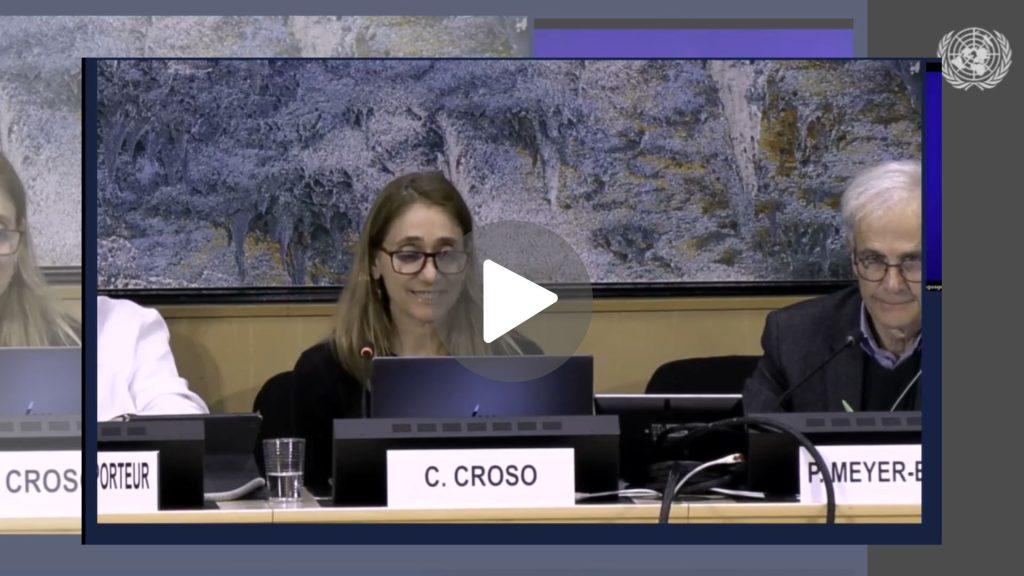During the UN Human Rights Council Social Forum, Camilla Croso, Executive Director of the CAFA, discussed the importance of academic autonomy and education in strengthening science.
“The right to academic freedom, understood as an integral part of the right to education, entails — she argues — the responsibility to seek truth, uphold ethical and professional standards, and apply knowledge to address current social challenges. This illustrates the fundamental relationship of the right to education as both a pillar and guarantor of the right to science.”
This statement was made by Camilla Croso, Executive Director of the Coalition for Academic Freedom in the Americas (CAFA), as she began her presentation at the UN Human Rights Council’s Social Forum, held on October 30 in Geneva.
Watch Camilla Croso’s full presentation at the UN:

Defending Education and Science Is an Act of Democratic Resistance
Before authorities, researchers, and activists, Camilla Croso participated in the panel “The contribution of education to the respect, promotion, protection, and realization of all human rights for all people.” She highlighted the deep interconnection between the right to education, academic freedom, and the right to science, stressing that defending these rights is essential for democracy and the fight against disinformation.
In her remarks, she emphasized the importance of education as a response to disinformation and scientific denial, noting that access to science must be understood as a universal human right that encompasses not only the natural and social sciences but also indigenous and traditional knowledge.
“Education is our most powerful antidote to disinformation and scientific denial. (…) Defending the right to science is inseparable from defending the right to education and academic freedom,” she stated.
According to her, scientific denial is not a marginal phenomenon but a structural challenge to democracy.
“In a world where denialism seeks to dispute the truth, defending education and science is an act of democratic resistance,” she affirmed.
Academic Autonomy for the Right to Science
During her presentation, Camilla Croso outlined five lines of action to advance a human rights agenda for the right to science:
- Reaffirm the rights to science, education, and academic freedom as pillars of democracy.
- Strengthen academic and research institutions and ensure their funding.
- Promote scientific education and human rights at all educational levels.
- Value, protect, and support teachers and researchers, ensuring their autonomy and decent working conditions.
- Promote multilateralism and South–South cooperation to combat disinformation, especially on climate issues.
Hope: For Academic Freedom, for the Strengthening of Democracy
At the end of her presentation, Camilla Croso underscored the importance of political and financial investment in strong educational systems that promote the right to education, the right to science, and the right to academic freedom.
“Ultimately, the message I want to leave you with is one of hope: by affirming the rights to education, science, and academic freedom within national, regional, and international legal and policy frameworks — by protecting educators, scientists, and students, and ensuring the free circulation of ideas — we not only make all human rights a reality but also preserve the very integrity of democracy,” she concluded.
Side Event: “Protecting the Right to Education in Armed Conflicts”
In addition to Camilla Croso’s participation, the issue of academic freedom was also featured in the launch of the policy brief “Protecting the Right to Education in Armed Conflicts.”
Held on October 30, 2025, the event addressed the growing violence against education in conflict settings, noting that in 2024 nearly 6,000 attacks were recorded against schools, universities, students, and teachers — along with the military use of educational facilities — representing a 166% increase since 2021. These attacks have left more than 52 million children out of school in conflict-affected countries.
The new Policy Brief by Special Rapporteur Farida Shaheed examines the scale and impact of these attacks, applicable international legal frameworks, and ongoing gaps in accountability and justice. The document outlines eight urgent priorities for national and international actors, including:
- Strengthening international and national norms that explicitly prohibit attacks on and military use of educational facilities.
- Reinforcing national mechanisms for investigation, prosecution, and reparation.
- Ensuring continuous, inclusive, and safe education during conflicts.
- Securing equitable access for all students, especially those displaced or discriminated against.
- Preventing the ideological manipulation of educational content.
- Integrating education into emergency and recovery planning and promoting dialogue with non-state armed actors to preserve the civilian nature of schools and universities.
Read more:
Launch of the Policy Brief on Protecting the Right to Education in Armed Conflict
